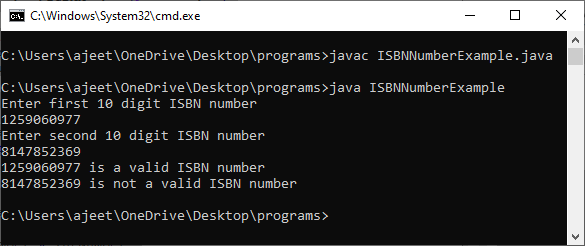ISBN is another special number in Java. ISBN stands for the International Standard Book Number that is carried by almost each every book. The ISBN is a ten-digit unique number. With the help of the ISBN, we can easily find any book. The ISBN number is a legal number when 1*Digit1 + 2*Digit2 + 3*Digit3 + 4*Digit4 + 5*Digit5 + 6*Digit6 + 7*Digit7 + 8*Digit8 + 9*Digit9 + 10*Digit10 is divisible by 11. The digits are taken from right to left. So, if the ten-digit number is 7426985414, Digit1 and Digit10 will be 4 and 7, respectively.
Let's take two numbers and check whether the numbers are legal or not.
Example:
Number1: 8147852369
Sum = (1*9) + (2*6) + (3*3) + (4*2) + (5*5) + (6*8) + (7*7) + (8*4) + (9*1) + (10*8)
Sum = 9 + 12 + 9 + 8 + 25 + 48 + 49 + 32 + 9 + 80
Sum = 281
Now, we divide the sum with 11 and check whether the remainder is 0 or not. If the remainder is 0, the number is a legal ISBN.
rem = 281 % 11
rem = 6 != 0
Number 8147852369 is not a legal ISBN because the remainder is not equal to the 0.
Number2: 1259060977
Sum = (1*10) + (2*9) + (5*8) + (9*7) + (0*6) + (6*5) + (0*4) + (9*3) + (7*2) + (7*1)
Sum = 10 + 18 + 40 + 63 + 0 + 30 + 0 + 27 + 14 + 7
Sum = 209
Now, we divide the sum with 11 and check whether the remainder is 0 or not.
rem = 209 % 11
rem = 0
Number 1259060977 is a legal ISBN because the remainder is equal to 0.
Steps to implement the ISBN program
These are the following steps that we use to implement the program of ISBN in Java.
- Take a ten-digit ISB number from the user.
- Check whether the user entered a ten-digit number or not because if the number is not a ten-digit number, it can't be an ISBN.
- Find each digit's sum by multiplying each digit from left to right by 1, 2, 3,…….,10.
- Find the remainder of the sum with 11. If the remainder is equal to 0, the number is an ISBN else, not an ISBN.




 Java programming
Java programming
ISBNNumberExample.java
Output

need an explanation for this answer? contact us directly to get an explanation for this answer